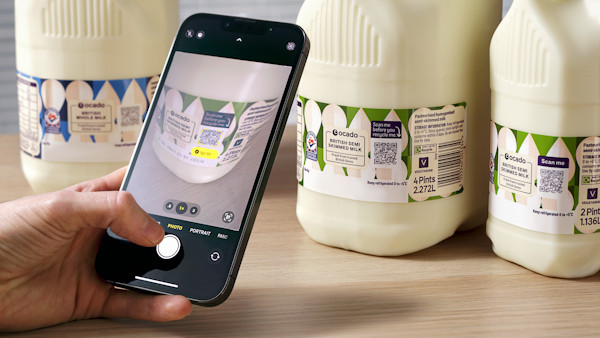Ocado Retail is working with recycling technology company Polytag and recycling app Bower to test the viability of Digital Deposit Return Schemes (DDRS).
For the first time, Ocado customers will receive a 20p monetary reward for scanning and recycling their packaging at home using their smartphones, representing a “significant transformation in the approach towards recycling”, which is more convenient than traditional Deposit Return Schemes (DRS) initiatives.
During the trial, customers can scan one of the unique QR codes printed onto Ocado’s own-label two and four-pint milk bottles, which will be available for delivery from today. The first 20,000 codes scanned will see consumers receive a 20p reward which will appear in their digital wallet in the Bower app – the same amount that will be redeemed as a deposit in the upcoming DRS legislation once it is rolled out in 2025. This 20p can then be withdrawn to their bank account.

Although consumers will not redeem a deposit – as it will not be added at the point of purchase – the partnership aims to demonstrate the viability of a DDRS by enabling people to receive a cash incentive for recycling using their smartphones.
The serialised codes – printed using standard industry printing processes at Interket UK – can only be scanned once, preventing consumers from repeatedly claiming back a deposit from the same pack. Additionally, the Bower app uses in-app GPS technology to validate that the consumer is claiming a 20p by standing within a close distance of a registered home recycling bin.
In addition, the on-pack QR codes also enable brands to access real-time data on packaging lifecycles, including if, when and where packaging is recycled, allowing them to streamline operations while communicating their sustainability strategies to consumers.
As well as the QR codes, invisible tags will feature on all product labels, which are going to be counted in two regional material recycling facilities using Polytag’s invisible tag readers. This means data captured in the app when a consumer claims their 20p reward will be mapped to the count of items identified in the material recycling facilities, demonstrating a full end-to-end DDRS solution.
Laura Fernandez, Senior Packaging and Sustainability Manager at Ocado Retail, commented: “To be able to launch a workable digital deposit return scheme that actually pays consumers back for recycling is a game-changing move for recycling and the circular economy in the UK. We already know that Ocado shoppers have an appetite for such a scheme as when we surveyed them last year, 80% were likely or very likely to scan a QR code for a deposit return.”
The firms involved in the trial noted that the success of DDRS could also be a major money saver for brands and retailers. Independent environmental consultancy Resource Futures recently estimated that a digital deposit return system would result in cost savings of £3.4bn over 11 years, compared to conventional DRS, because it would negate the need for reverse vending machines to be installed countrywide. It’s also forecast to be less carbon-intensive because consumers can simply put packaging into kerbside collection for recycling.
Alice Rackley, CEO, Polytag, said: “In its response to the DRS consultation in January, the UK Government encouraged innovators to continue to demonstrate that the technology for a DDRS exists. Our partnership with Bower and Ocado Retail is the next step in demonstrating the viability of a DDRS in the UK.”
Suwar Mert, CEO and Founder at Bower, added: “For the first time, we now have a pioneering technology for a digital deposit return scheme. Consumers can now embark on a rewarding recycling journey by using mobile phones and regular recycling bins. Over 500,000 users are already using the app and get rewarded not only for their bottles and cans but for all packaging with a barcode. We can elevate the recycling rates and put speed and scale behind the transition towards a circular packaging economy”.



